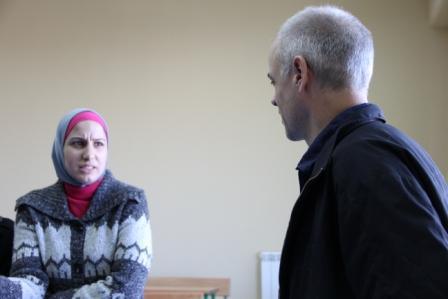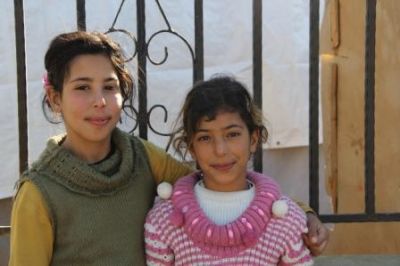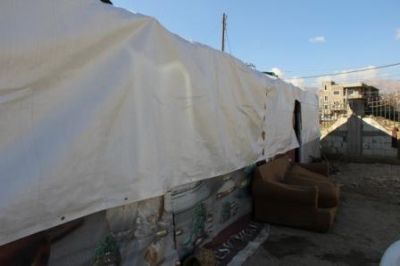Lebanese Generosity: “They are our family, not just our neighbours,”
Justin’s given us another raw, emotional blog from the communities of refugees in Lebanon across the Syrian border as families flee into a world they don’t recognise. Read his first blog from Beirut here.
As you’ll see, Lebanon is doing all it can to support the influx of people, but the pressure they – and the children of fleeing families – are under is almost too much to bear.
Here’s Justin:

By Justin Byworth, CEO, World Vision UK
Bekaa valley, 27 November 2012
Today was a Damascus road experience. Literally.
Two thousand years after the biblical life-changing encounter of the apostle Paul with Jesus Christ, today’s Damascus road is a place where tens of thousands of Syrian refugees first encounter the welcome of their Lebanese neighbours.
The grim, growing reality I saw today is that the number of refugees threatens to overwhelm the generosity of Lebanon and the concerted efforts of international humanitarian organisations. It’s here in the Bekaa valley that the majority of Syrian refugees in Lebanon have fled.
Shareen, who we met teaching refugee children in a World Vision ‘Child Friendly Space’ told us passionately that, “They are our family, not just our neighbours, we are doing our best to help them.” The toll it’s taking, though, is clear, “In my home town there are more Syrians than Lebanese now and there’s no more space.”
The humanitarian response has geared up but isn’t keeping up as was clear meeting Karim, World Vision’s response manager, in the Bekaa office that we share with UNHCR (the UN High Commission for Refugees), the World Food Programme and Danish Red Cross. While over 70,000 Syrian refugees have been registered here, the backlog of those awaiting registration is getting out of control. On top of this are the thousands of Lebanese and Palestinian returnees plus the Syrians who don’t want to register for fear of consequences back home.
The reality of this for children recovering from trauma without the normality of home, friends or school is unbelievably tough. 11-year-old Taghrid and her cousin Nagham are just two of 12 children living in a crowded tent like construction together with their parents and grandparents. They’ve been there four months and neither are in school yet.
“We play with each other, but we don’t have any friends here. I miss my home in Syria.”
 Their parents told us of the horror of their last weeks in Homs, their home town, “We used to hear planes all the time and then the bombs got too close. When it was only 100 metres from the house the children were shocked and scared, so we escaped to the mountain nearby – we were lucky to escape with our lives.”
Their parents told us of the horror of their last weeks in Homs, their home town, “We used to hear planes all the time and then the bombs got too close. When it was only 100 metres from the house the children were shocked and scared, so we escaped to the mountain nearby – we were lucky to escape with our lives.”
Just days later their three-storey home was razed to the ground. “We were frightened, so how could we tell our children not to be frightened? Now even when a normal plane goes overhead they are afraid by the memories.” We are just 15 minutes drive from the Syrian border and World Vision colleagues tell us that they often hear bombs in the distance.
The combined help of locals and aid agencies has made a real difference; the family’s shelter was built together with Lebanese neighbours with the wood frame, tarpaulin, mats and even a small stove all given to them.
 They told us how food vouchers and hygiene kits from World Vision “helped us survive the first few weeks here” and we’re now providing blankets, stove and fuel coupons to help them through the winter.
They told us how food vouchers and hygiene kits from World Vision “helped us survive the first few weeks here” and we’re now providing blankets, stove and fuel coupons to help them through the winter.
Our Child Friendly Spaces – where we saw children as young as three playing, drawing and learning – are helping children prepare to cope in the Lebanese school system which uses French and English as well as the Arabic they share.
Taghrid’s father Ayman is still worried for the future, though, “I have no idea what to do or where to go – I’m still looking for a job” and with the local economy under pressure there simply isn’t enough work for all those who need it.
As I have found time and time again over the last 25 years, it is people’s resilience in the midst of disaster, poverty and injustice that gives me hope. As we talked with Ayman and his wife Saher, outside their makeshift home, they bring us coffee. Truly humbling to share in their gift of hospitality to us.
Taghrid plays hide and seek with Nagham, then shows us round their tiny living, sleeping and eating areas and tells us how she helps her Mum make soup. Mariam, a refugee herself is now teaching Syrian children not yet in school. A local Lebanese elder tells us of another refugee family he’s just met living in the park who need our assistance.
World Vision’s been working in the Bekaa valley for 15 years and with these local relationships and the humanitarian community we can, I pray, weave a safety net that will help Taghrid and the thousands like her survive the months ahead. This will only be possible if the world does not forget the Syrian people. As news headlines come and go, tragically the displaced people of Syria cannot.
A remarkable, emotional story and humbling to read of the lives being forced upon so many people. Share your views on the World Vision Facebook page and let us know what you think.